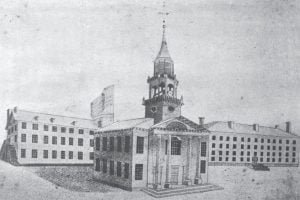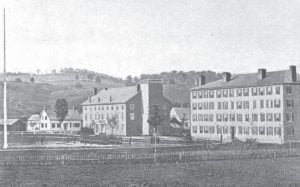In 1835, the American Literary, Scientific, and Military Academy became “Norwich University,” by virtue of an act of incorporation granted by the legislature of Vermont the previous year. Captain Alden Partridge remained at the head of the institution until 1843, and soon after sold the buildings and grounds to the Trustees of the University.
There was one feature in the scheme of education established at Norwich University which honorably distinguished it from nearly all other similar institutions of its time in New England. From the first it was wholly free from sectarian influence. This principle was prominently set forth in its charter as drawn by its founder, Captain Partridge, which provided
“that no rules, laws or regulations of a sectarian character, either in religion or politics, should be adopted or imposed; nor shall any student ever be questioned or controlled on account of his religious or political belief by the Board of Trustees or the Faculty of said institution, either directly or indirectly. ”
In his prospectus of the University, declaring the principles upon which it was founded, Captain Partridge begins as follows:
”Everything of a sectarian character in religion is utterly excluded from its walls. The founders of this Institution, as well as the legislature of Vermont which granted the act of incorporation, believed that there was no natural or necessary connection between the propagation of sectarian dogmas, and education rightly understood. They believed that the great object of education should be to prepare youth in the best possible manner for the correct and efficient discharge of the great duties of life, in any situation in which fortune or circumstances may place them, by the due cultivation and improvement of the physical and moral energies, and the storing of their minds with useful human knowledge. They believed that by such a system our youth would become patriotic citizens and useful members of society, instead of going forth into the world bigoted sectarians and wrangling theologians, aiming to stir up excitements and introduce discord into the community, thereby destroying that respect which the great body of the people feel for pure religion, and inflicting upon it serious injury. Good morals, however, and a sacred regard for the great principles of religion, as understood and reverenced by the great majority of the people, are strictly and earnestly inculcated. The students are required to attend divine service on the Sabbath, except such as have conscientious scruples to doing so. Those who do not attend church are strictly required to remain in their rooms during church time. The reading and careful examination of the Bible are earnestly enjoined upon all.”
Colonel Ransom, too, soon after assuming the duties of president, after quoting (in the annual catalogue of 1843-4) from the act of incorporation of the University as above recited, proceeds to say:
”From these extracts it will be seen that the University is based on broad and liberal principles, both in respect to politics and religion, and that it recognizes the creed of no sect or party, thus being modeled after, and corresponding to, the great civil and political institutions of our country, and suited to the character of a free people.
“To give our youth an education that shall be American in its character, to enable them to act as well as to think, to execute as well as to conceive to tolerate all opinions when reason is left free to combat them, to make moral, patriotic, efficient and useful citizens, and to qualify them for all those high responsibilities resting upon a citizen of this free republic was the design of the founders of this College.” 1

It is believed that the character and policy of the University, as above outlined, was ever faithfully adhered to by each of the above broad-minded and liberal men. It would be difficult, indeed, to imagine either Captain Partridge or Colonel Ransom condescending to revoke the engagement of a Commencement orator selected and paid by their students, on account of the supposed heterodox opinions of such orator on topics of current discussion; or to think of them as engaged in borrowing permanently from the libraries of Norwich University, books donated by the students themselves, lest their minds should become infected by theological heresies thought to be contained in such books, as has repeatedly been done by the faculty of a neighboring institution even in recent years.
The service that Norwich University did for the country, in furnishing a supply of trained and competent officers for commanding and drilling the armies which the loyal North sent into the field during the first years of the rebellion, can hardly be overestimated. The following number of graduates from Norwich University, with their rank in the service, is taken from the history of that institution, lately published, viz: —
Army:
- Brigadier Generals 8
- Major Generals 6
- Colonels with brevet rank of Brigadier Generals 14
- Colonels 35
- Lieutenant Colonels 34
- Majors 24
- Captains 155
- First Lieutenants 68
- Second Lieutenants 23
- Non-commissioned officers and enlisted men 82
- Surgeon Generals 1
- Surgeons with rank of Major 10
- Assistant Surgeons with rank of Captain 7
Total 467
Navy:
- Admirals 1
- Chaplains 1
- Rear-Admirals 2
- Commanders 2
- Commodores 6
- Lieutenant Commanders 1
- Captains 7
Total 20

The above honorable list includes George Dewey, Admiral, U. S. Navy; and (natives of Norwich) G. A. Converse, rear-admiral, U. S. Navy; George Partridge Colvocoresses, captain, U. S. Navy; Edward B. Williston and T. E. G. Ransom, brigadier-generals, U. S. Army.
In response to an urgent call for troops for the defense of Washington, in the early summer of 1862, a company of cavalry was raised at Hanover, N. H., composed of students from Dartmouth College to the number of about forty, who were joined by twenty cadets from Norwich University, by a few college graduates and friends of the students, and three or four from Bowdoin College to make up a full cavalry troop of eighty-two men. Mr. S. S. Burn of the Junior class of Dartmouth, who was the prime mover in the enterprise, was chosen captain and Theodore H. Kellogg of Hillsboro, Ohio, and William H. Stevens of Woodstock, Vt., first and second lieutenants. This is said to have been the only instance of a military organization composed distinctively of college students that served in the Union Army during the war. As there was no cavalry corps then forming in either Vermont or New Hampshire, the company offered their services to Governor Sprague of Rhode Island, who was recruiting a squadron of mounted men, and were promptly accepted.
An interesting little volume called The College Cavaliers, published by Mr. S. B. Pettengill, of Grafton, Vt., who was one of the Dartmouth students composing the company, shows that they did gallant service for the country during the three months’ campaign (the period of their enlistment) in which they were engaged. The company left Hanover for Providence June 18th, where they were joined with another company raised in that city to form the seventh squadron of Rhode Island cavalry. Here they received their equipment and were drilled a few days by Major A. W. Corliss, who had been appointed to the command of the detachment. The squadron reached Washington June 30th, and remained near that place and Alexandria, Va., during most of July under constant drill. About the 1st of August they were ordered to the Shenandoah Valley, and were attached to the infantry brigade of General Julius White of Indiana. In this vicinity they were engaged in active service for several weeks, doing picket duty, making reconnaissance’s and pursuing rebel raiders, until, early in September, on the advance of General Lee with the whole Confederate Army into Maryland, they were shut up with ten thousand Union soldiers in Harper’s Ferry, under the command of Col. D. H. Miles. With the other Union Cavalry to the number of about two thousand, belonging to Colonel Miles‘ division, the “College Cavaliers” escaped capture by resolutely cutting their way through the rebel lines then completely investing the place, on the night preceding the surrender, September 15th.
The term of service for which they had enlisted was now just expiring, but they generously volunteered to remain until after the battle of Antietam and the hasty retreat from Maryland of the rebel army had relieved the country from immediate alarm and anxiety. They were mustered out of service at Providence October 1, 1862, having done considerable skirmishing with the enemy, although not present in any important engagement, and having received the highest praise of their commanding officers for bravery and good conduct. None of their number fell in battle. Cadet A. W. Coombs, of Thetford, died of typhoid fever at Winchester, Va., about the middle of August. Two others were captured by the enemy about the same time, were taken to Richmond, and after a brief stay in Libby Prison were discharged in time to be mustered out with their comrades at Providence. We append a list of the Norwich Cadets who served in this company, with name, rank, and residence:
- Theodore H. Kellogg, First Lieutenant, Hillsboro, O.
- Tillinghas, Adjutant.
- Bush, Sergeant Major.
- Henry E. Alvord, First Sergeant, Greenfield, Mass.
- George A. Bailey, Corporal, Woodstock, Vt.
- Douglas Lee, Corporal, Lenox, Mass.
- W. L. Burnap, Private, Grafton, Vt.
- A. W. Coombs, Private, Thetford, Vt.
- William S. Dewey, Private, Quechee, Vt.
- E. J. Everett, Private, Greenfield, Mass.
- C. W. Gregg, Private, Boston, Mass.
- William S. Goodwin, Private, Boston, Mass.
- A. T. Hastings, Private, West Medway, Mass.
- W. S. Hazelton, Private, Strafford, Vt.
- Arthur Morey, Private, Norwich, Vt.
- A. L. Papanti, Private, Boston, Mass.
- H. N. Phillips, Private, Greenfield, Mass.
- C. W. Smith, Private, Washington, Vt.
- F. H. Walcott, Private, New York Mills, N. Y.
- E. P. Walcott, Private, Utica, New York.
Citations:

